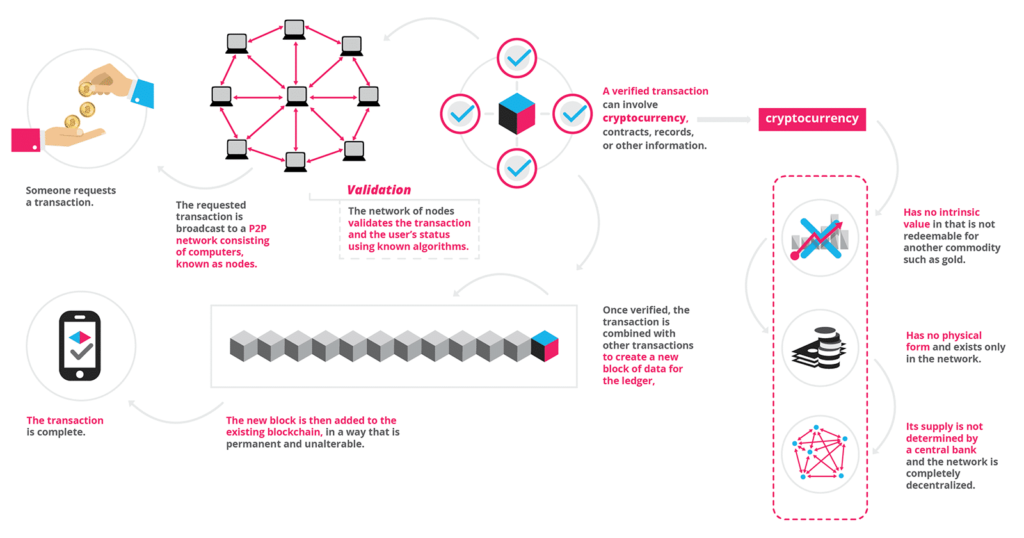Does Blockchain and cryptocurrencies represent the future?
Blockchain technology. Due to many ups and downs, especially negative news mainly related to cryptocurrencies, doubts remain whether the Blockchain is the technology of the future or just another scum. Let’s take a closer look on this.
How does Blockchain really work?
Blockchain is a decentralized database in peer-to-peer (p2p) architecture used to store and send information about transactions or payments. Transactions (or nodes) create blocks, which size depends from the used implementation. If the block is filled with information, another block of data is automatically created as part of the chain of blocks. In blocks we can store e.g information about ownership status, commercial transactions, electricity bills or cryptocurrency. Due to its multiple applications Blockchain is also gaining popularity in public administration and banking.
 https://blockgeeks.com/guides/what-is-blockchain-technology/[/caption]
https://blockgeeks.com/guides/what-is-blockchain-technology/[/caption]
Decentralization is the key
The peer-to-peer network that characterizes Blockchain does not require any central computers or management systems. Every single computer in the network has the same access when it comes to transferring and authentication of transactions. The users who share the computing power of their devices (so-called miners) for block digging usually receive reward in form of tokens.
 https://blockgeeks.com/guides/what-is-blockchain-technology/[/caption]
https://blockgeeks.com/guides/what-is-blockchain-technology/[/caption]
The main benefits of using blockchain technology are:
-
- Security – a distributed database is less exposed to cyber attacks as transactions are supported by cryptography and secured by private and public keys with an signature attached,
-
- Transparency – transactions form a chain of blocks and remain on the network in their original version without the possibility of amendments. Moreover, it is possible to track the operation’s history from the beginning of the network’s existence. From the legal point of view, transactions are signed digitally with the use of cryptographic algorithms, still maintaining the anonymity of users,
-
- Negligible system maintenance and transaction costs,
-
- Elimination of a trusted third party during the transaction, such as banks, commercial intermediaries etc.,
-
- Reliability of transactions,
-
- The ability to carry out transactions every single day a year,
- Continuous development and improvement of Blockchain technology due to many open-source projects and a wide community.
Cryptocurrencies in Blockchain ecosystem
Cryptocurrency is a medium of exchange functioning in digital world, formed on the basis of cryptography. Generally speaking, cryptocurrency as a digital currency has to do with the use of tokens based on the distributed ledger technology, which stands for Blockchain. Cryptocurrency is used for operations on a Blockchain network, when it comes to buying, selling, investing, trading.
Besides playing “monetary tool” role cryptocurrencies are a driving motor for startups. It works for great ideas seeking for financial support. Startups create an initial price offering (ICO) by issuing tokens which are supposed to finance the idea standing behind the business. Thanks to ICO, startups can collect very large funds to kick off its projects.
ICO is one of the earliest stages in the life of every cryptocurrency. This is the moment when a coin is “offered” to a community that somehow identifies with the project or a company. Usually, for each ICO phase, we have a fixed price for which we can buy a coin. If we find a promising project or a company product and we are able assess overall credibility, we can very easily invest in a given undertaking.
However, as the great history of frauds shows, there are many cases where startups disappear after collecting a few million dollars. That is why many countries set up legal rules for carrying out the ICO.
In Asian countries such as South Korea and China ICO has been banned, while in Europe – Malta is leading the way and still openly invites Blockchain startups.
Cryptocurrencies as many other digital assets have security issues. Media storm about hacker attacks on cryptocurrency exchanges do not help perceive Blockchain as a safe technology. The biggest attacks this year were:
– 500 million NEM (about $533 million) for the Japanese Coincheck Stock Exchange,
– 17 million Nano (about $187 million) million for the Italian BitGrail stock exchange,
adding smaller incidents of fraud, the sum of stolen money reaches almost $1 billion. It is over 3 times more than in 2017.
Unfortunately, all attacks were a consequence of poor stock market security. But the negative patch was pinned not only to cryptocurrencies but to the Blockchain itself. The main consequences of these events were huge declines on stock exchanges. For example, Bitcoin with its ATH (all-time-high) $20.000 now drifts at a horizontal about $4.000.
Forecast for 2019
Despite many negative news, we should not underestimate Blockchain technology. Many projects that have accumulated huge funds during ICO are still working hard to implement the promised functionalities in their Whitepapers (project analysis and description of milestones) and now are slowly entering the decisive phase.
There are also positive news, whereas many banks and global corporations confirm the use of Blockchain in their promising projects. Time will tell us if Blockchain will revolutionize the IT world, but one thing is sure – although this technology had its beginning over 10 years ago it is still being developed and improved by a huge community of IT and high technology experts.
We are convinced that there are still many positive news awaiting us. One of Blockchain enthusiasts, – the director of the Bitcoin Foundation, Brock Pierce said: “This innovation is more substantial than the internet. The blockchain is going to have an even larger impact.”. This can be true.







